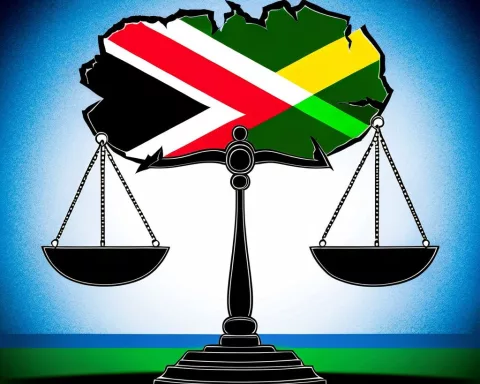President Cyril Ramaphosa’s leadership in South Africa is a tricky puzzle. He struggles to control his party, the African National Congress (ANC), which is filled with different groups and opinions. This confusion spills over into his government, making it hard to create clear policies, especially on energy. As he tries to balance many voices in a coalition government, he faces huge challenges like high unemployment and economic inequality. Ramaphosa’s cautious style of leadership sometimes makes it seem like he’s unsure, which adds to the chaos around him.
What are the challenges facing President Cyril Ramaphosa’s leadership?
President Cyril Ramaphosa faces several challenges, including:
– Lack of control over the African National Congress (ANC) and its internal factions.
– Fragmented governance and conflicting energy policies within his cabinet.
– The complexities of coalition governance amid socio-economic pressures.
These factors hinder his ability to implement cohesive policies effectively.
Intricacies of South African Politics Under Ramaphosa
South African politics has always been multifaceted, and the complexities have only deepened during President Cyril Ramaphosa’s time in office. Political analyst Moeletsi Mbeki has scrutinized Ramaphosa’s leadership, highlighting numerous challenges that continue to destabilize the African National Congress (ANC) and the coalition government. Mbeki’s insights, shared on the SMWX podcast with Sizwe Mpofu-Walsh, offer a vital perspective on Ramaphosa’s leadership tactics and their broader consequences.
Mbeki points out that Ramaphosa’s presidency has been characterized by an apparent lack of control over his party and cabinet. This perceived frailty within the ANC has translated into a fragmented and often contradictory governance style. A glaring example of this disunity is evident in the differing attitudes towards energy policies. Mineral Resources and Energy Minister Gwede Mantashe remains a staunch advocate of coal, despite the government’s push for greener energy alternatives. Mantashe’s stance sharply contradicts the administration’s green energy goals, yet he retains his ministerial position. This schism is symptomatic of Ramaphosa’s broader challenge in unifying his administration under a cohesive vision.
Leadership challenges are not uncommon; however, they are particularly pronounced in the ANC, a party known for its vigorous internal debates and factions. The influential ‘inner circle’ of the ANC appears to exclude Ramaphosa, further weakening his grip on the party. According to Mbeki, Ramaphosa sees himself as an outsider within the ANC, limiting his ability to enforce party decisions effectively.
The Chaotic Government of National Unity
Reflecting on the broader impact of Ramaphosa’s leadership, Mbeki touches on the chaotic nature of the government of national unity. This coalition, formed out of necessity rather than ideological consensus, complicates governance. Coalition governments are inherently intricate, requiring delicate balancing to maintain harmony among diverse political factions. South Africa’s current situation is no different; the inclusion of multiple political parties has exacerbated existing governmental disarray. Mbeki notes that this complexity questions Ramaphosa’s capability to navigate the tangled political landscape effectively.
Ramaphosa’s struggles stem from various sources. One significant factor is the ANC’s legacy and culture, characterized by ideological battles and personal rivalries. The party’s history, deeply tied to South Africa’s anti-apartheid struggle, has fostered a dynamic but often contentious internal democracy. ANC leaders frequently find themselves balancing the need to assert authority with the necessity to maintain unity among the party’s disparate factions. This balancing act can undermine decisive leadership, evident in Ramaphosa’s tenure.
Ramaphosa’s leadership style may also contribute to these challenges. Known for his cautious, consensus-seeking approach, Ramaphosa often favors mediation over dictation. While this style can encourage a more inclusive decision-making process, it can also be perceived as indecisiveness, especially during crises when clear, assertive action is needed.
The Future of Coalition Governance in South Africa
Mbeki’s critique raises important questions about the future of coalition governance in South Africa. The current partnership with other political parties, necessitated by the ANC’s reduced majority, adds another layer of complexity to an already intricate political scenario. Effective coalition governance requires not only political acumen but also the ability to forge and maintain alliances amidst shifting political landscapes. Ramaphosa’s perceived lack of control over his party could complicate these efforts, potentially leading to further instability.
Understanding Ramaphosa’s challenges requires considering the broader socio-economic context of South Africa. The country faces significant issues such as high unemployment, economic inequality, and service delivery failures. These deeply rooted challenges place immense pressure on any administration. Ramaphosa operates in an environment where the stakes are extraordinarily high, and the margin for error is slim.
Historically, the ANC has been seen as a party of liberation, associated with the moral high ground of the anti-apartheid struggle. However, in the post-apartheid era, the party has had to transition from a liberation movement to a governing entity, a shift accompanied by growing pains. Corruption scandals, inefficiencies, and internal conflicts have tarnished the ANC’s image and eroded public trust. Ramaphosa, who came to power with promises of renewal and reform, faces the daunting task of rebuilding this trust while addressing the country’s pressing socio-economic issues.
Broader Themes in Political Leadership
Interestingly, Ramaphosa’s predicament echoes broader themes found in political history and theory. The tension between the need for strong, decisive leadership and the demands of democratic governance is a recurrent motif. Leaders who prioritize consensus and inclusivity often find themselves at odds with the need for swift, unilateral action, particularly in times of crisis. Ramaphosa’s leadership, with its emphasis on mediation and negotiation, fits within this broader paradigm, highlighting the perennial challenge of balancing authority with democratic principles.
In the realm of political analysis, Mbeki’s critique serves as a potent reminder of the complex interplay between individual leadership styles and broader institutional dynamics. Ramaphosa’s tenure illustrates how the personal attributes of a leader can interact with, and be constrained by, the structures within which they operate. This interaction, in turn, shapes the efficacy and stability of governance.
Ramaphosa’s leadership journey underscores the intricate nature of political governance in South Africa. His cautious approach, while fostering inclusivity, has faced criticism for lacking decisiveness. The chaotic coalition government further complicates his leadership, raising questions about the future stability of South African politics. Understanding these dynamics offers valuable insights into the challenges and complexities of leadership within a multifaceted political landscape.
“`markdown
FAQ on President Cyril Ramaphosa’s Leadership
What are the primary challenges facing President Cyril Ramaphosa’s leadership?
President Cyril Ramaphosa faces several significant challenges, including:
– A lack of control over the African National Congress (ANC) and its internal factions.
– Fragmented governance and conflicting energy policies within his cabinet.
– The complexities of coalition governance amidst socio-economic pressures like high unemployment and economic inequality. These challenges hinder his ability to implement cohesive policies effectively.
How does internal division within the ANC affect Ramaphosa’s leadership?
Internal divisions within the ANC significantly impact Ramaphosa’s leadership. The presence of various factions and differing opinions creates a fragmented governance style, making it difficult for him to enforce a unified party agenda. This disunity is highlighted by conflicting stances on key issues, such as energy policy, where influential party members advocate for opposing approaches.
What role does coalition governance play in the challenges faced by Ramaphosa?
Coalition governance complicates Ramaphosa’s leadership, as it requires balancing various political factions within a government formed out of necessity rather than ideological alignment. The inclusion of multiple parties increases complexity and challenges his ability to maintain harmony and cohesion in policy-making, which can lead to further instability in governance.
How does Ramaphosa’s leadership style contribute to the perceptions of indecisiveness?
Ramaphosa is known for a cautious, consensus-seeking approach to leadership, often preferring mediation over assertive decision-making. While this style fosters inclusivity, it can also be perceived as indecisiveness, especially during crises when swift action is required. This perception can undermine public confidence in his ability to lead effectively.
What socio-economic issues complicate Ramaphosa’s leadership in South Africa?
South Africa faces significant socio-economic challenges, including high unemployment, economic inequality, and service delivery failures. These deep-rooted issues place immense pressure on Ramaphosa’s administration, complicating efforts to implement effective policies and address the needs of the population, which heightens the stakes for his leadership.
How has the ANC’s historical context influenced Ramaphosa’s leadership challenges?
The ANC’s legacy, rooted in the anti-apartheid struggle, has fostered a dynamic yet contentious internal democracy characterized by ideological battles and personal rivalries. As the party transitions from a liberation movement to a governing entity, it struggles with internal conflicts and corruption scandals that have eroded public trust. Ramaphosa’s leadership must contend with these historical complexities while attempting to rebuild trust and implement reform.
“`












